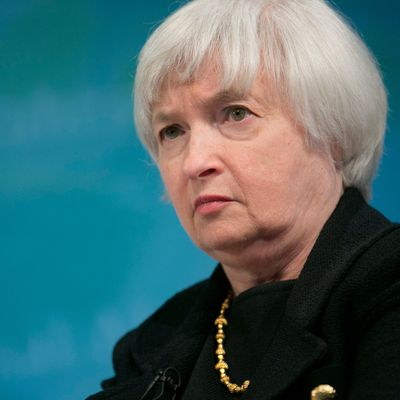
Joe Biden plans to make Janet Yellen the first female Treasury secretary in U.S. history.
Last week, the president-elect said that he had settled on his pick to lead the highly influential Cabinet department — and that his choice would “be accepted by all elements of the Democratic Party, from the progressive to the moderate coalitions.” Many observers took that as a long-winded way of saying “it’s Yellen.”
The 74-year-old former Fed chair has spent much of her career occupying the left flank of deeply conservative institutions. Her sympathies for labor, concerns about inequality, and promotion of women’s labor-force participation made her a borderline communist by Federal Reserve standards. Yet, a decades-long immersion in the realm of Very Serious People has left Yellen with many beliefs that mark her as a borderline conservative by progressive metrics. Most critically, Yellen sits on the board of the Committee for a Responsible Federal Budget, an organization devoted to preventing full employment, slashing entitlement benefits, and undermining a green energy transition so that, 50 years from now, America’s grandchildren won’t be burdened by an imaginary debt crisis as they ride armored dune buggies across the desiccated remains of California. Yellen has argued that America’s current debt path is “completely unsustainable,” a view that arguably puts her to the right of Larry Summers, the arch-neoliberal economist so loathed by progressives, they organized a successful campaign to block his appointment as Fed chair in 2013, thereby clearing the way for Yellen to take the post. Summers wrote last year that “the risks associated with high debt levels are small relative to the harm cutting deficits would do,” going on to suggest that America’s debt trajectory was quite plausibly sustainable, given an environment of durably low interest rates.
All of which is to say: Yellen is a consensus pick in that she is only mildly disappointing to progressives and moderates alike.
Happily, Yellen appears to have had a “come to ‘money print go brrr’” moment. In a recent interview with the Wall Street Journal, Yellen said, “This is not a good time to have fiscal policy switch from being accommodative to creating a drag … That’s what happened [last decade], and it retarded the recovery.” She went on to explain that persistently low inflation had both “increased the need for and lowered the risks of aggressive monetary and fiscal policy.”
As vice chair of the Federal Reserve in 2010 through 2014, Yellen earned a reputation as a monetary dove. Conscious of the “devastating” impact that long-term unemployment has for workers and their families, Yellen favored keeping interest rates low to promote tighter labor markets, even as more conservative board members pushed for rate hikes to preempt inflation. Once she became chair of the central bank, however, a compulsion to strike a middle-ground between the institution’s doves and hawks led Yellen to begin raising interest rates in late 2015. In hindsight, this was economically harmful — and, arguably, politically calamitous. We know now that there was zero risk of accommodative monetary policy triggering inflation in 2015; the U.S. economy can, in fact, sustain an unemployment rate lower than 5 percent without entering an inflationary spiral. Yellen’s rate hikes thus likely contributed to a slowdown in economic growth in 2016, a development that hurt vulnerable workers and Hillary Clinton’s presidential campaign: Given how narrow the 2016 election’s margins were, it is quite conceivable that a slightly stronger economy would have earned the Democrats a new lease on the White House and spared us all the last four years of unvarnished dystopia.
Nevertheless, Yellen’s dovish tenure ultimately facilitated Jerome Powell’s ascension to the Fed chairmanship, and subsequent establishment of a new, loose-money paradigm at the central bank (something that Powell’s white skin, male secondary sexual characteristics, and longtime Republican affiliation gave him the “credibility” to do). And today, on both fiscal and monetary policy, Yellen seems largely aligned with the progressive wing of the Democratic Party.
Which is good. Since, as Treasury Secretary, Yellen would exert considerable influence over Biden’s recovery plans. Most directly, Yellen would have significant authority to reactivate and reshape the emergency lending programs that the Fed and Treasury set up to backstop credit markets last spring. Yellen has suggested that she sees the central bank’s protocols for lending to small and midsize businesses as “insufficiently generous.”
She would also have significant power over regulatory policy. The Treasury Secretary chairs the Financial Stability Oversight Council, a body that has broad authority to monitor excessive risks in the practices of Wall Street firms. Yellen has argued for maintaining and expanding post-2008 banking regulations, arguing earlier this year that regulators should be given the power to monitor the indebtedness of nonfinancial corporations, in addition to large banks.
In sum, Yellen is unlikely to be a significant obstacle to a sane policy response to the present economic and public-health crises. But if Democrats don’t prevail in Georgia in January, the Senate could end up being an obstacle to Yellen’s confirmation.






























